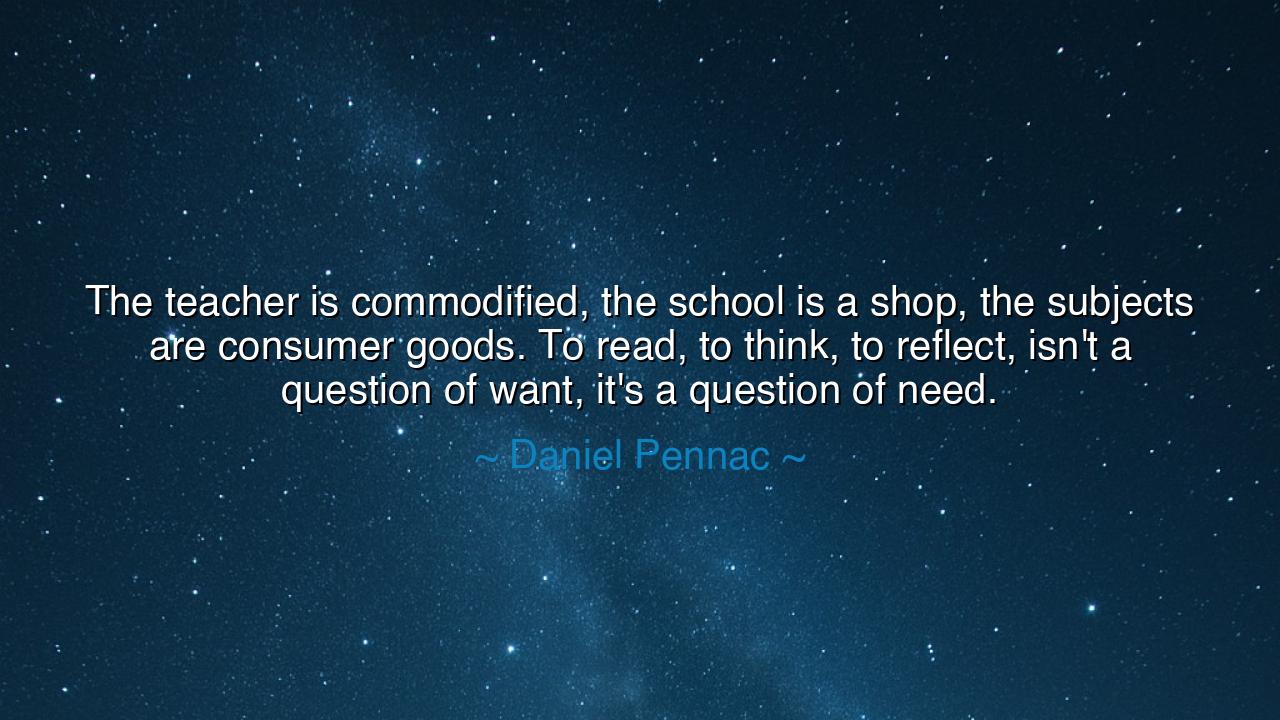
The teacher is commodified, the school is a shop, the subjects
The teacher is commodified, the school is a shop, the subjects are consumer goods. To read, to think, to reflect, isn't a question of want, it's a question of need.






Hear the voice of Daniel Pennac, who warns us with words both sorrowful and profound: “The teacher is commodified, the school is a shop, the subjects are consumer goods. To read, to think, to reflect, isn’t a question of want, it’s a question of need.” This saying reveals the peril of our age, when sacred things are treated as merchandise, and the temple of learning is mistaken for a marketplace. Yet within it also lies a reminder of what cannot be bought or sold: the hunger of the human soul for wisdom, meaning, and truth.
The teacher, once revered as a guide, is here reduced to a commodity, a worker in the machinery of consumption. The school, instead of a sanctuary for minds, is likened to a shop, where lessons are bartered, graded, and sold like goods upon a shelf. The subjects, which ought to be living pathways into the mysteries of the world, are instead treated as products to be consumed, their worth measured not by the soul they enrich, but by the profit they yield. Pennac cries out against this distortion, for when learning becomes commerce, its sacred purpose is forgotten.
Yet he does not leave us only with lament—he reminds us of the deeper truth: to read, to think, to reflect are not luxuries of desire, not idle entertainments for those who “want” them, but necessities of being, as vital as bread and water. Just as the body perishes without nourishment, the mind withers without thought, and the spirit darkens without reflection. Learning is not consumption—it is survival, it is liberation, it is the act that keeps the human spirit alive.
Consider the story of Socrates, who owned no school, sold no lessons, and yet gave freely of his wisdom in the markets of Athens. He was condemned by the powerful, who could not bear his relentless questioning. But he did not stop, for he knew that to think was not a pastime but a duty, and that to reflect was the very essence of being human. He lived—and died—proclaiming that wisdom was no commodity, but the highest necessity of life.
History bears many warnings of what happens when learning is reduced to transaction. In the twilight of the Roman Empire, schools became places where rhetoric was bought and sold, stripped of spirit, taught for gain rather than truth. The result was generations skilled in persuasion but empty of virtue, whose voices could charm but whose hearts could not lead. Rome fell, not for lack of learning, but for learning drained of meaning. Pennac’s words echo this lesson: when education is treated as consumerism, civilization weakens at its core.
But there is also hope in his words, for he points us back to what is eternal. To read is to enter another mind and expand our own. To think is to wrestle with truth until it shapes us. To reflect is to draw wisdom from the flow of time and anchor ourselves in meaning. These acts are not for sale, nor can they be taken from us. They are the birthright of every soul, rich or poor, young or old. They are not wants—they are needs.
The lesson is clear: guard against the commodification of learning. Do not treat teachers as vendors, nor schools as shops, nor subjects as mere products. Approach education as a sacred act, a nourishment of the soul. And in your own life, cultivate the disciplines Pennac names: read deeply, think carefully, reflect often. Do not wait for others to sell you wisdom—seek it freely, for it is your lifeblood.
So let Daniel Pennac’s words endure: “To read, to think, to reflect is not a question of want, it is a question of need.” Carry this truth within you, and pass it on as an inheritance. For if we treat learning as a commodity, it will vanish like coins spent in the market. But if we honor it as a necessity, it will remain an eternal flame, lighting the path of humanity through the darkness of time.






AAdministratorAdministrator
Welcome, honored guests. Please leave a comment, we will respond soon